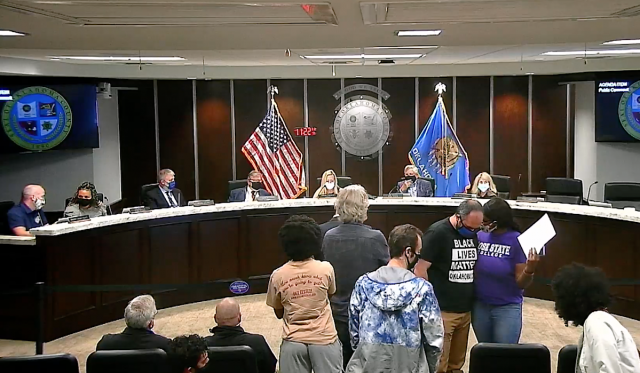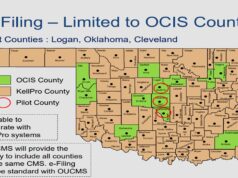

A meeting of the Oklahoma County Criminal Justice Authority turned heated again today as the body voted to give jail CEO Greg Williams authority to award a $3 million contract for work on the jail to an out-of-state contractor and moved the date of a vote on the Immigration and Customs Enforcement Agency’s presence in the jail to mid-October.
The potential $3 million contract to Harrison, Walker and Harper, LP of Paris, Texas, would be for the company to do work on the jail’s plumbing system. Those funds would come from $34 million in CARES Act funds the Oklahoma County Board of Commissioner’s accepted in August and transferred to the OCCJA, also called the jail trust.
Controversy stirred over the declaration of the contract as an emergency. Typically, most county contracts go through a bidding process. By declaring the $3 million project an emergency, it allows the trust to bypass that process, according to its legal counsel John Michael Williams.
But trust member Francie Ekwerekwu asked for clarity on what exactly constitutes the emergency.
“Can someone explain what the emergency is?” she asked. “This item was put on the agenda (…) First this meeting was scheduled as a special meeting last week. This item wasn’t placed on the agenda until a day or two ago, and it was labeled an emergency. So if it is indeed an emergency, what is the emergency, and what are the legalities surrounding the emergency that are prompting us to take this action?”
Deadline cited for emergency
Trust member Jim Couch said the trust is up against a tight deadline to spend CARES Act funds before Dec. 30, which is one reason why he considered the work to be urgent and an emergency.
But Danny Honeycutt, who was representing Oklahoma County Sheriff P.D. Taylor on the trust, also raised concerns about the timing and the lack of worker’s compensation insurance in the contract with the Texas firm.
“I’m not denying that we’re up on a very tight clock,” he said. “My concern would be trying to label our inaction as now an emergency, so I would like some weigh in by our counsel.”
Williams said it’s up to each trust member to determine if the Dec. 30 deadline to spend the funds constitutes an emergency.
“The question of an emergency is a question of fact,” he said. “If you as a trustee believe there is an emergency, yes you should vote for the emergency.”
Williams said the COVID-19 situation at the jail is arguably an emergency.
“Now the nature of the emergency is, arguably — and again this if for you to determine — but the COVID-19 virus is causing grave problems in the Oklahoma County Detention Center, so the sooner steps can be taken to improve that situation, that is the emergency,” he said.
Other concerns raised
Honeycutt also questioned other aspects of the contract that guarantees the company a profit.
“The design builder will ultimately receive $3 million whether they complete the work or not,” he said. “I find that troublesome. If there are any portions of the projects we cancel, the design builder would receive a profit from that component piece. I don’t believe we could use CARES Act funds to fund that, so where would that money come from?”
Williams also clarified that the trust wasn’t voting to approve the contract Wednesday. It was instead voting to allow jail CEO Greg Williams to finalize the contract on his own.
Honeycutt, who serves as the Oklahoma County Sheriff’s Office’s legal counsel, said that was also problematic.
“There are a tremendous amount of questions I have on this,” he said. “For us to be asked as a member of this body to approve a resolution that will allow someone else to make all these decisions for us, I think that’s negligent.”
In the end, Honeycutt and Ekwerekwu voted against the resolution, which passed 6-2. Chairwoman Tricia Everest and trust members Kevin Calvey, M.T. Berry, Jim Couch, Sue Ann Arnall and Ben Brown voted in favor.
ICE vote moved
At its Sept. 21 meeting, the trust voted 4-2 to not allow the Immigration and Customs Enforcement Agency to have office space within the jail. But after Everest dropped from the call, Williams later declared the vote to be invalid because five votes are required to pass a resolution.
At the time of that vote, Everest, who was present by telephone at that meeting, allegedly had technical problems that caused the call to be dropped. It’s unclear if she made attempts to re-connect and vote on the resolution.
On Wednesday, Everest introduced a motion to move a proposed re-vote on the resolution from Oct. 5 to Oct. 19. When asked by Ekwerekwu why she was proposing to move the vote, Everest said the decision is about efficiency.
“That is so we continue to meet so we could be able to be more efficient with our time in gathering together in order to fully execute all items of the business that we need to do in the public,” Everest said.
Her statement drew the ire of members of the public.
“Tricia Everest, you are a racist!” an audience member shouted.
The resolution passed 7-1, with only Ekewerekwu voting no.
Calvey chided for inattention
There were two public comment portions of Wednesday’s meeting. But Calvey, a county commissioner, appeared uninterested in remarks from the public with his head down, staring at his phone during both sessions.
At one point, audience members chastised him for his inattention to their comments.
“Get off your phone, Calvey! Pay your constituents some respect!” one audience member shouted.
Mark Faulk, who was speaking at the time, agreed.
“Yeah, for real, Calvey, at least pay attention during the damn meeting,” Faulk said.
Calvey did not acknowledge the audience’s complaints and continued staring at his phone.




















